Behavioural aspects among Cruise Ships Passengers affecting the Spread of Infectious Diseases including COVID-19: A Systematic Review
Sheila Siame1, Despoina Andrioti Bygvraa1*, Delér Shakely1, Lynn M Hulse2, Varvara Mouchtouri3 and Christos Hadjichristodoulou3 for the HEALTHY SAILING project consortium
1School of Public Health & Community Medicine, Sahlgrenska Academy, University of Gothenburg, Sweden
2FSEG, Faculty of Engineering and Science, University of Greenwich, UK
3Laboratory of Hygiene and Epidemiology, Faculty of Medicine, University of Thessaly, Greece
Submission:December 11, 2023;Published:December 21, 2023
*Correspondence author: Despoina Andrioti Bygvraa, School of Public Health & Community Medicine, Sahlgrenska Academy, University of Gothenburg, Sweden
How to cite this article:Siame S, Bygvraa DA, Shakely D, Hulse LM, Mouchtouri V, Hadjichristodoulou Ch. et al. Behavioural aspects among Cruise Ships Passengers affecting the Spread of Infectious Diseases including COVID-19: A Systematic Review. Oceanogr Fish Open Access J. 2023; 17(1): 555953. DOI: 10.19080/OFOAJ.2023.17.555953
Abstract
Outbreaks of infectious diseases have been reported among tourists on board cruise ships as well as on land-port based premises. Behavioural interventions have been implemented to prevent and mitigate the spread of infectious diseases. This study aimed to identify determinants of behavioural aspects as well as the facilitators and barriers to compliance with preventive measures. A systematic search of literature in Scopus, and Web of Science was conducted. The Joanna Briggs Institute (JBI) checklist, the National Institute of Health (NIH), and the Mixed Methods Appraisal Tool / Checklist (MMAT) were used to appraise the quality of the articles. Four studies with a total of 3103 cruise ship passengers were included. Respondents reported having low knowledge levels (76%) related to preventive measures before COVID-19, with considerable improvement (89.5%) shown in the articles published after the pandemic. Studies examining attitudes and practices reported satisfactory levels. Generally, limited research on cruise ship passengers regarding the three components of Knowledge, Attitudes, and Practices (KAP) exist. The review found that cruise passengers should understand the negative effects of a disease to undertake preventive actions. This should be accompanied with empowerment strategies to motivate individuals to change attitudes. In addition, there is a need to disseminate evidence-based information through responsible and trusted institutions. This survey could help in the designing of relevant prevention, mitigation and control policies for infectious diseases.
Keywords: Knowledge; Attitude; Practices; COVID-19; Facilitators; Barriers
Introduction
The cruise sailing has become a major part of the worldwide tourism industry [1]. According to the Cruise Line International Association (CLIA), the industry has consistently increased in popularity, growing at a rate of 6.8% between 2009 and 2019 [2]. Modern large cruise ships are reported to carry approximately 5,000 travellers per trip and are characterized by amenities such as casinos, spas, multiple dining venues, and restaurants, among others [3].
Due to this environment, passengers from different geographical regions spend most of their time indoors and intermingle for extended periods in semi-enclosed areas [4]. Frequent social events, compounded by the relatively significant period of time passengers spend on board, increase the likelihood of contact among passengers [5,6]. This provides an environment for the spread of infectious diseases from one person to another or indirect transmission through contaminated surfaces [3,4]. Infectious diseases also have the potential to spread from cruise ships to the general population, adding to the rate of transmission and disease burden [7].
Infectious disease outbreaks among cruise ship passengers can result in high economic costs to the tourism industry [8]. Through the combined effort of different stakeholders, several measures have been developed and implemented to raise awareness and, consequently, curb the spread of diseases on cruise ships [4,9-13]. Behavioural interventions have long been recognized as fundamental in ensuring that travellers do not act as vectors for infectious diseases, as well as protecting passengers themselves from infection [14]. Many such measures have been introduced and strengthened as a response to COVID-19, including screening, avoidance of crowded places, washing hands regularly or using hand disinfectants, wearing face masks, and seeking medical advice upon noticing symptoms [6]. However, the level to which passengers adhere to these measures partly depends on their knowledge about the disease, their attitude toward it, and the practices they undertake to follow the measures. There is a need to prioritize the assessment of the knowledge, attitude, and practices of passengers to improve targeted intervention strategies. Furthermore, there is a need for regularly updated scientific literature due to the constantly evolving nature of infectious diseases.
This study aimed to identify determinants that influence the spread of infectious diseases as well as the facilitators and barriers to compliance with preventive measures among cruise passengers. This was done through investigating and synthesizing available evidence on the knowledge, attitude, and practices (KAP) of passengers boarding cruise ships. The KAP is related to infectious contamination and compliance with prevention policies [5,6]. The review was guided by the following questions:
a) What behavioural and cultural factors have influenced outbreaks of infectious diseases including COVID-19 among cruise ship passengers?
b) What social, behavioural, and cultural factors influence compliance with prevention, mitigation, and management measures of infectious diseases including COVID-19 among cruise ship passengers?
Methods
We conducted a systematic review of existing evidence on KAP related to infectious diseases among cruise ship passengers. The Preferred Reporting Items for Systematic Reviews and Meta-Analysis (PRISMA) were used to report the findings of this review. The review protocol was registered in PROSPERO 2023 CRD42023393140.
Search Strategy
A systematic search of peer-reviewed articles addressing infectious diseases among passengers was conducted in two electronic databases: Scopus and Web of Science. In addition, the search was supplemented by Google Scholar for related literature. The search was conducted using carefully selected keywords, including “traveller,” “beliefs,” “infectious diseases,” and “cruise,” and their associated indexing terms. The search string was established using Boolean operators “AND” and “OR”. Bibliography lists from all eligible articles were manually searched to identify additional articles that could be relevant for inclusion. Table 1 includes a detailed list of keyword combinations and Table 2 the search strategy for each database.
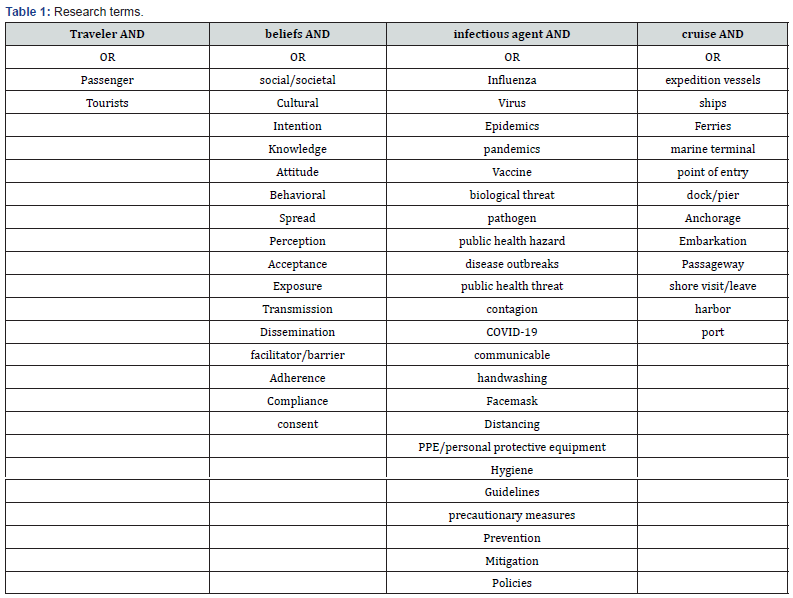
Note: different forms of search terms including plural were included.
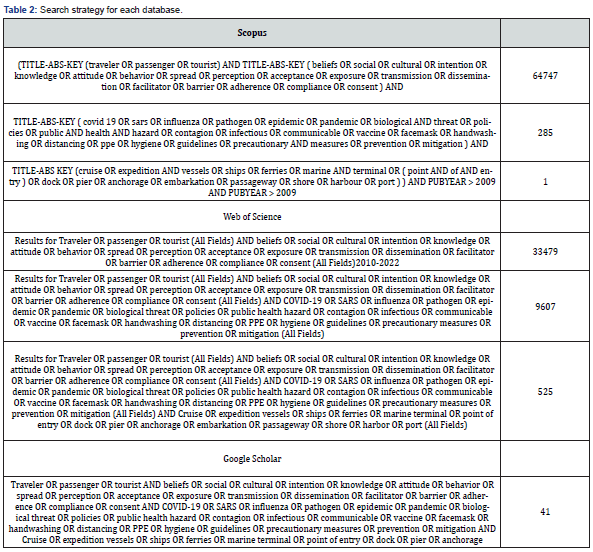
Inclusion and Exclusion Criteria
We included all peer-reviewed articles published between the year 2010 and 2022. Included studies needed to explore at least one study outcome (knowledge, attitudes, or practices associated with infectious diseases among passengers in the cruise ship industry). To gain a better understanding of this area of study, qualitative, quantitative, and mixed-method studies were reviewed. Articles containing insufficient information or omitting outcomes and findings of interest were excluded. We also excluded editorials, systematic reviews, and case studies. The full inclusion and exclusion criteria are presented in Table 3.
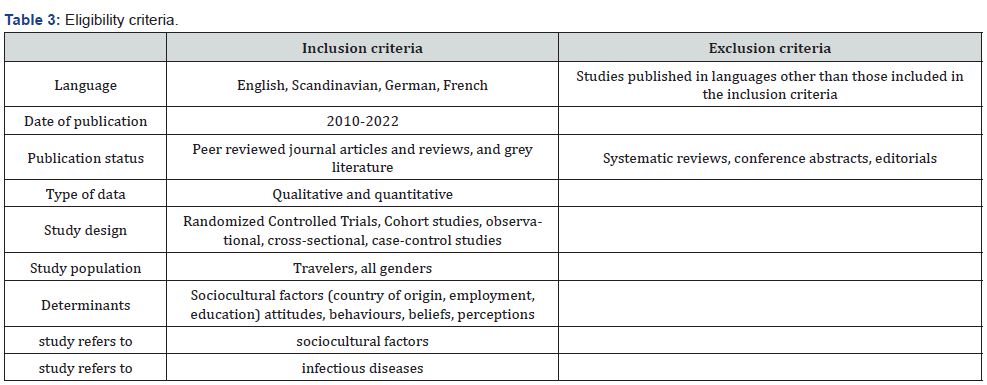
Screening and Selection Process
All relevant articles from each database were saved and exported to the EndNote-20 reference manager and duplicates were removed. The remaining articles were later exported to Rayyan software where two reviewers (SS and DAB) independently screened the title and abstract of potentially eligible studies. During the selection process, articles were sorted into one of three categories: “include,” “maybe,” and “exclude.” Full texts of all articles not initially excluded were then evaluated by the reviewers against the inclusion and exclusion criteria. Any disagreements that arose were resolved through consensus discussion and cross-checking of articles by the review team.
Methodological Quality Assessment
To assess the methodological quality of the included articles, two independent reviewers (DAB and SS) critically appraised the articles. Four separate checklists were used for the quality assessment: the Joanna Briggs Institute (JBI) checklist for Cohort studies, the JBI checklist for Qualitative studies, the National Institute of Health (NIH) checklist for Observational Cohort and Cross-Sectional studies, and the Mixed Methods Appraisal Tool / Checklist (MMAT). All members of the research team cross-checked the quality assessment of each article to limit bias. Table 4 contains detailed information on the appraised studies. Scoring criteria was used to calculate the quality of the studies. Articles that scored more than 75% were considered to be good quality.
Data Extraction and Synthesis
Two reviewers (SS and DAB) independently extracted relevant data using a pre-defined form. The extracted data included the name of the author, year of publication, study title, study objective, location, study design, sample size, data collection tool, and main outcome measure. The results of the studies related to KAP were tabulated in a separate table. Since both qualitative and quantitative studies were included, a narrative synthesis was done (Table 5).
Results
Study selection
A total of 851 articles were identified, 424 of which remained after removing duplicates. Subsequently, 284 articles were removed after screening the titles. The abstracts of the remaining 140 full-text articles were screened against the eligibility criteria and 136 articles were excluded, as they did not address infectious diseases or were related to passengers on other modes of transport. Only 4 articles remained and were considered for the methodological quality appraisal phase. A description of the quality appraisal for each study is presented in Table 4. Each of the remaining articles scored over 75% and were thus included in the review. The complete study selection process is presented in figure 1.
Studies characteristics
All four articles included in this study were published in English. Studies were conducted in Europe (n=1), the Atlantic area (North America and Europe n=1), and Australia (n=1). One article did not report the origin of the study. Two articles reported on COVID-19, one reported on Norovirus 1, and one article did not mention a specific infectious disease. The primary evidence base was varied and comprised the following: retrospective cohort (1), cross-sectional (1), qualitative (1), and mixed methods (1). Of the four articles, three were published in 2021 and one in 2022 . The sample size of the included articles ranged from 30 to 1532 passengers. The general characteristics of the included studies are presented in Table 5.
Synthesis of results
The overall synthesis of the selected articles utilized thematic analysis (Table 6). Three themes were identified during the initial phase of the review: knowledge, attitudes, and practices (KAP) related to an infectious disease. None of the included articles examined all the 3 components of the KAP model simultaneously. Attitudes [15-17] and practices [15,16,18] were the most studied components, while knowledge was only discussed in one article [15].
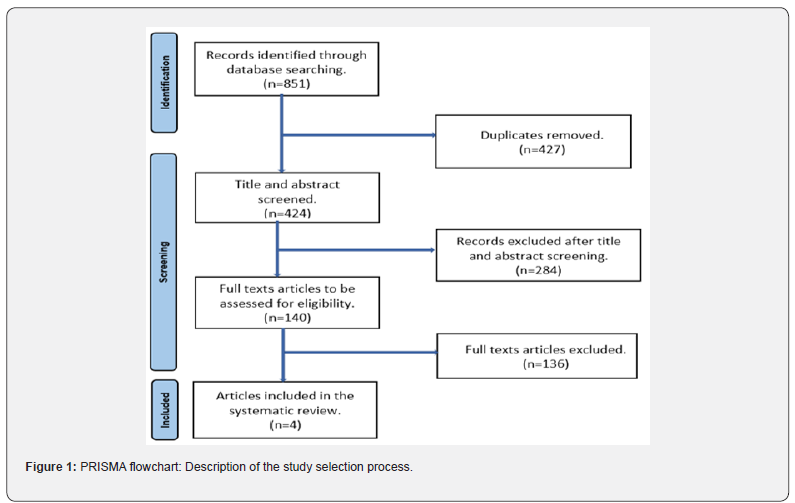
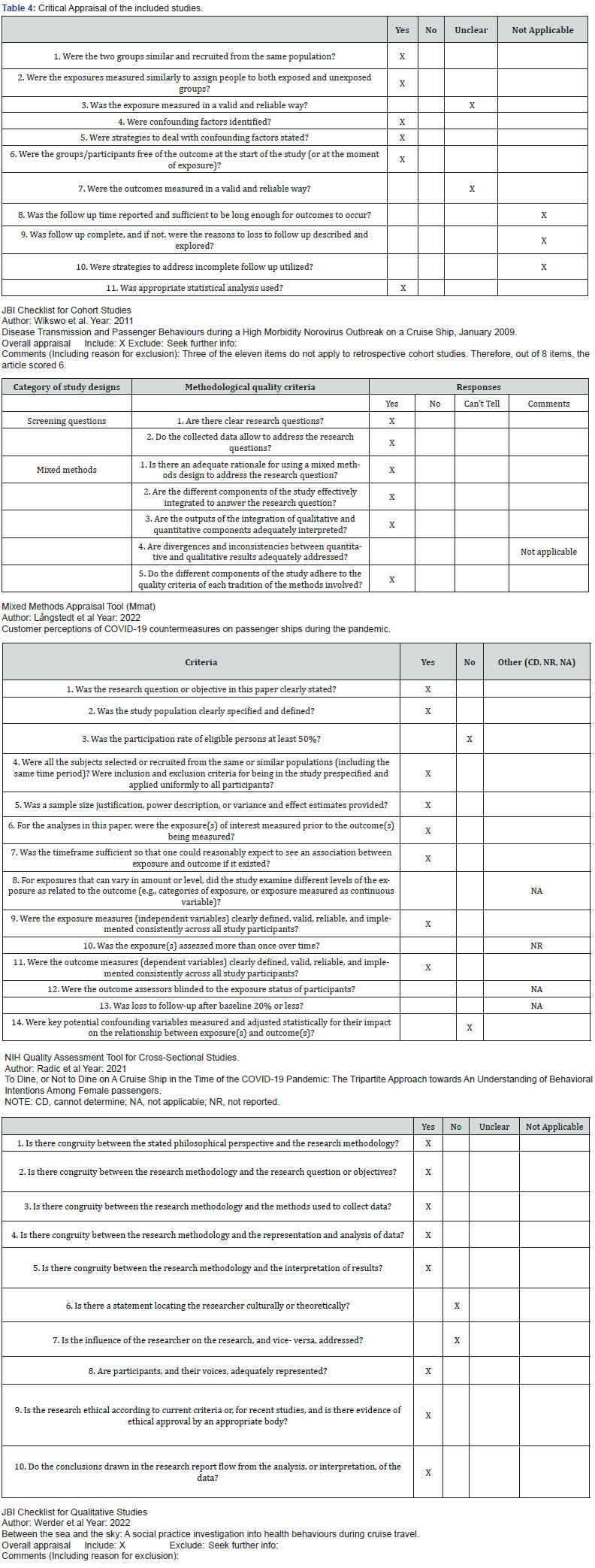
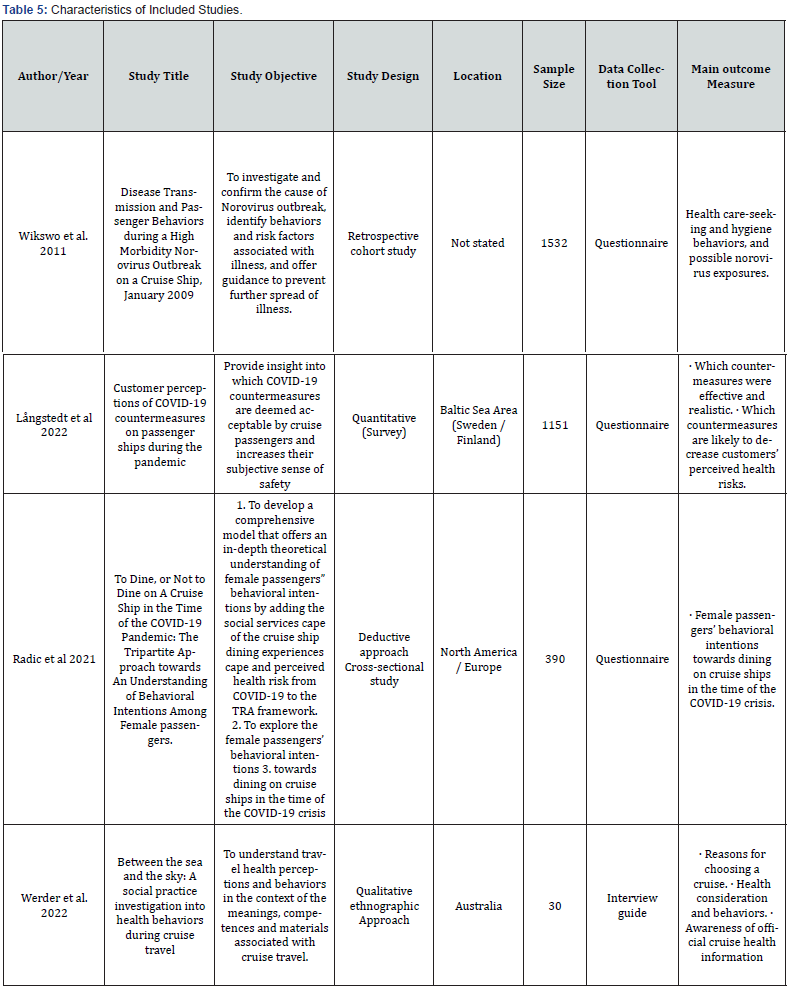
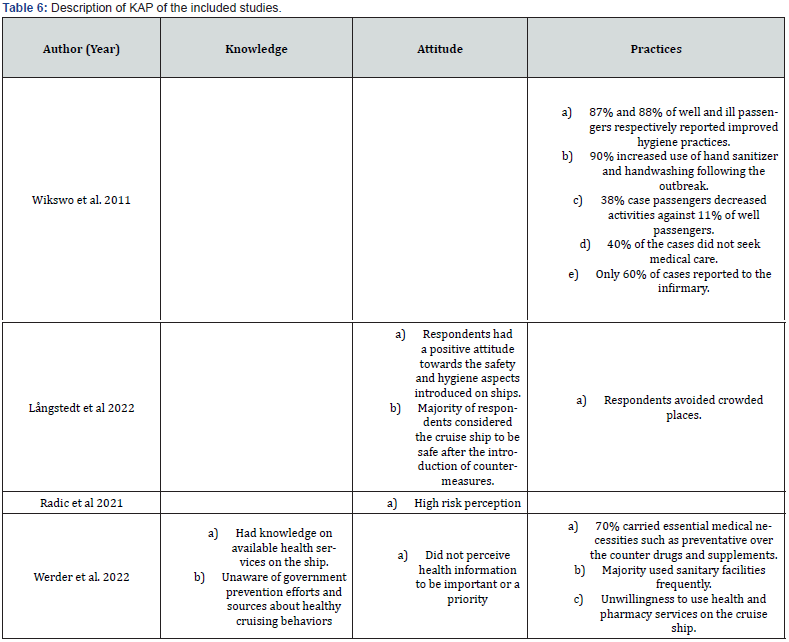
Knowledge
Findings from a study conducted before the COVID-19 pandemic in Australia indicated that passengers were not knowledgeable about, nor aware of, government efforts on disease preventive measures [15], despite extensive governmental efforts to communicate them. Furthermore, awareness of health services on the cruise ships was mixed. Most passengers knew where the evacuation routes were located, but they were less aware of where to seek health services in case of illness. When probed, the respondents indicated it was difficult to find the medical center. They further stated that the costs of using health services on the ship were exorbitant, hence it was unnecessary to know the location of the medical clinic as they did not intend to utilize the services. In addition, passengers did not foresee serious health scenarios during cruising. They further stated that they did not have to worry about anything because the cruise company took care of them [15].
Respondents were asked whether an increase in the presence of different types of social media would assist in cruise health knowledge acquisition and increase awareness efforts [15]. In general, passengers did not want to be pushed to a specific digital media environment but preferred to seek out information they considered to be appropriate or appealing. Many respondents preferred information sources that were more proximal to travel preparation and commencement. However, when the respondents were asked to identify media platforms that would assist them in acquiring adequate health-related information, most mentioned Facebook, cruise traveller websites, and direct email or postal mail from cruise organizers, perhaps indicating that older adults are less comfortable with newer social media. Other platforms mentioned included community-based efforts and short SMS messages with links to more detailed information. The respondents suggested that the information should be made easy to access and involve stakeholders such as cruise companies [15].
Attitudes
Results from the two studies during COVID-19 emphasized that respondents were afraid of contracting infectious diseases such as COVID-19 [16,17]. In one study, respondents reported that they dreaded being infected while cruising as it was perceived as a significant loss with a huge impact on their health, as compared to the gains of going on holiday [17]. The perceived risk of contracting COVID-19 pushed passengers into despair, which developed into fear over time and resulted in a significant negative effect on passengers’ behavioural intentions [17].
The second study that addressed COVID-19 aimed to determine which countermeasures were likely to decrease passengers’ perceived health risks and which passengers would agree to (or not) on cruises during the pandemic. Findings indicated that passengers had a positive attitude toward good hygiene and they perceived it to be crucial in terms of health and safety while on a cruise. Respondents also indicated that they put a high level of trust in the crew staff [16]. The availability of hand sanitizer and the general cleanliness of the ship were noted as important factors in terms of hygiene [16]. However, respondents reported having a negative attitude toward the use of face masks. This was partly attributed to controversial information by different stakeholders about a lack of evidence on the proven effectiveness of the use of face masks during the initial phase of the COVID-19 pandemic [16]. Various respondents stated that there is no evidence that masks protect the people wearing them from infection and hence they could not replace preventive measures such as social distancing and good hygiene. Respondents from a study conducted in Australia, before the COVID-19 pandemic, reported that they themselves portrayed a negative attitude toward health measures intended to prevent the spread of infection disease while on a cruise ship. This was because they did not perceive any risk of a major health emergency during their trip. Some respondents stated that they would still choose to go on a cruise in the event of a health crisis, but they would carry more medicines with them [15].
Practices
A retrospective cohort study on a norovirus outbreak on a cruise ship reported that passengers who contracted the virus reduced their activities by 38% when advised and non-infected passengers reduced their activities by 11% [18]. Furthermore, 88% of cases and 87% of non-infected passengers stated that they changed their hygiene practices after increased knowledge about the norovirus outbreak. Over 90% of those who changed their hygiene practices indicated that they increased the use of hand sanitizers and handwashing [18]. Additional good practices reported reduced the frequency of travel by ship to once a month and avoiding crowded places during the COVID-19 pandemic [16-18]. Health preparedness was reported to be an everyday practice of some passengers. About 70% of the respondents reported that they carried hand sanitizers and vital medicines such as preventive over-the-counter drugs, and supplements. Some respondents reported carrying prescription medication while cruising [15].
Risky practices were also reported by respondents in two studies [15,18]. In the retrospective cohort study the cruise ship suspected to have had a norovirus outbreak, approximately 40% of case passengers did not seek medical care because they were asymptomatic or did not feel ill [18]. In addition, respondents who had prior cruise trips were significantly less likely to seek health care services as compared to first-time cruisers [18]. However, most case passengers changed their hygiene practices after learning about the norovirus outbreak.
Risky practices also included inadequate consideration or concerns for health during cruise holidays before the COVID pandemic [15]. This study reported that information-seeking behaviour before and during cruising was not regarded as a priority. Even though the respondents were asked to take health-related photos while cruising, the respondents seemed to take few health-related photos for the health photo diary. When probed further during the interview to define good health behaviour, respondents reflected only on eating healthy, exercising, and dealing with seasickness [15]. They reported seasickness, sunburns, and dehydration as the only serious health conditions that they could face during a cruise trip. There was no mention of any infectious diseases. Overall, a mix of routine practices while cruising was reported to be because of information acquired from social media or word of mouth pre-travel and following other travellers’ behaviours [15].
Discussion
Infectious diseases are one of the most important public health problems globally [19]. The recent coronavirus pandemic has been cited to have had effects on the economy, health, social and psychological aspects of individuals [20]. Behaviour change interventions have been reported to be effective in preventing the spread of diseases [14]. A systematic review was therefore conducted to synthesize and understand the knowledge, attitudes, and practices of cruise ship passengers related to infectious disease.
Ignorance about existing government measures to mitigate and prevent infectious diseases onboard cruise ships was exhibited by the passengers in one study, despite readily available information on the internet and pamphlets on healthy cruising and protective behaviour [15]. These findings are comparable to those reported by a study that aimed to examine the knowledge, attitudes, and practices of travellers about travel-related infectious diseases [21]. The study reported that only 24.2% reported high levels of knowledge and 11% were aware of the preventive measures available. However, it is important to note that both of these studies [15,21] were conducted before the COVID-19 pandemic, a disease that increased awareness and knowledge of the global populace. Findings from the post-COVID-19 studies demonstrated contrary results. A recent systematic review aimed of KAPs related to COVID-19 among the general population reported that 89.5% of studies that examined knowledge reported good levels of knowledge [22]. The cruise industry has in the past experienced disease outbreaks such as norovirus but never has the industry experienced one that was as fatal as the COVID-19 pandemic [8].
When asked about available health services onboard cruise ships, respondents knew more about safety-related as compared to health-related services. They were able to identify where evacuation routes were located and procedures in case of an emergency. Fewer among the respondents could identify the location of the health clinic onboard. This may be attributable to the efforts made by the cruise companies and cooperating partners to implement programs and sensitize passengers to safety-related issues. The lack of adequate knowledge about the location of health facilities could also be due to the trust that passengers have in the cruise ship staff as well as the desire for a carefree trip. Passengers reported feeling a sense of security due to the presence of friendly cruise ship staff, and they placed significant trust in cruise employees to safeguard health and safety in uncertain situations [15,16]. The role of cruise ship personnel during a health crisis should therefore not be underestimated.
Findings from this review highlight the importance of health education to improve knowledge as crucial to behaviour change. Health education programs were found to improve awareness and knowledge, thus contributing to the uptake of mitigative and preventive measures [22,23]. In addition, it is necessary to disseminate easily accessible information through different means including social media as well as travel related websites on health threats, having in mind a balance between safety and leisure.
The response to the COVID-19 outbreak is an example of how extensive use of media, influenced and increased levels of information and knowledge regarding the pandemic [24,25] but on the other hand it showed how misinformation spread out through these channels. Some authors argue that knowledge does not directly translate into behaviour change, but it promotes positive attitudes toward the behaviour in question [26]. Results from a scoping review study on facilitators and barriers to occupational safety interventions in the fishing industry indicated that the acquisition of knowledge formed the basis for a change in perceptions and attitudes toward risky behaviour [27]. The role of comprehensive knowledge as a catalyst for changes in behaviour is well established [27-29].
Respondents were generally optimistic and demonstrated a positive attitude toward preventive measure related to the infectious disease of interest. Regarding COVID-19, respondents indicated a greater fear of contraction due to its potential to be fatal. They perceived general cleanliness and the use of hand sanitizers onboard to be fundamental in preventing the spread of COVID-19. Health-related information and warnings through various avenues such as social media may have influenced the positive attitude of respondents. Health literacy programs, in the face of a threatened outbreak, are vital in reducing the spread of communicable diseases and deaths. Positive perceptions and attitudes of individuals toward the potential for prevention of a disease are known to be effective in their response to the disease and compliance with interventions [22,26]. Our findings are in line with those reported by a systematic review examining the KAPs of the general population globally [22]. Results from this study indicated that 100% of the studies reported that respondents had a positive attitude toward prevention of COVID-19 [22]. However, a pre-COVID-19 study on KAPs related to infectious diseases among travellers conducted in Italy, indicated that 91% of the respondents perceived a low risk of getting an infection during travel [21]. Only 12% considered taking preventive measures before departure [21].
Since April 2020, EU Healthy Gateways and the CDC recommended the use of face masks on board ships to prevent the spread of COVID-19. However, some respondents expressed negative attitudes toward the use of face masks [16]. This was partly attributed to statements issued by their government early in the pandemic suggesting that there was a lack of evidence on the efficacy of the use of face masks to prevent COVID-19. This observation demonstrates the role that government authorities can play in influencing the adoption and uptake of recommended international guidelines. Furthermore, a lack of coordination among stakeholders has been reported to have created difficulties in implementing and sustaining programs due to the target population receiving confusing information during the implementation process, which can further lead to a lack of confidence in the relevant authorities [27]. Therefore, there is also a need to strengthen collaboration between governments and global policymakers in providing appropriate, evidence-based guidelines and information. With this objective in mind, the Healthy Sailing project—a research and innovation action project funded by the European Commission—works toward the aim of reducing the spread of communicable diseases on board passenger ships by creating evidence-based guidelines for infectious disease prevention, mitigation, and control.
Good practices indicated by respondents in the current study included the intention to reduce travel frequency, avoidance of activities and large gatherings, and improved hygiene practices [16,18]. Regarding seeking medical care, only 60% of case respondents sought medical care and most of them were first-time cruise passengers. Poor health information-seeking behaviour was widespread among participants in one of the pre-COVID-19 articles [15]. Respondents exhibited low-risk perceptions and hence, they did not seek out vital information on the prevention of infectious diseases while onboard. This was despite the availability of information on viral and bacterial risks and preventive measures by the local authorities on the internet and in the form of healthy cruising leaflets. There is a high likelihood that before the COVID-19 pandemic, cruise passengers were more concerned with health issues they believed to be relevant at that time, including seasickness, dehydration, and sunburns; hence, they overlooked information addressing infectious diseases. Similar findings are indicated in a study on infectious diseases, which reported that 93.3% of respondents did not practice any of the recommended preventive measures [21]. However, after the onset of COVID-19, passengers have developed a culture that recognizes the importance of access to relevant health information before and during travel. This is evidenced by findings from another systematic review reported that 93.2% of respondents practiced satisfactory behaviour of [22]. The most cited practices in another study were hand hygiene (80%), social distancing (70%), and avoidance of crowded places (75%) [29].
Generally, research findings indicate that understanding and awareness of the negative effects of a disease are crucial for individuals to undertake preventive actions [22]. There has been a long-term belief that empowering individuals with health-related information could change their behaviour [23,26]. However, some studies have found that knowledge does not directly translate into behaviour change [14,26]. Perceived health risk from contracting infectious diseases has been shown to hinder negative behavioural intentions [26]. Thus, there is a need to motivate people to change their risk perception and health beliefs. In addition, there is a need to disseminate evidence-based and up-to-date information through responsible and trusted institutions and media outlets to increase passengers’ knowledge, and change their attitudes, in order to change their practices. This is in addition to the increasing commitment of government officials and policymakers.
Limitations and strengths
Only four articles were available for inclusion in the study. In addition, there was variation in the methodology of the articles included as well as the critical appraisal tools used. Hence, the reliability of the study may be compromised. The variation in the type of study and methodologies used made comparisons between studies difficult; thus, the review placed little focus on such comparisons and instead tried to illustrate an overall picture of behaviours among cruise ship passengers regarding the spread of infectious diseases. A strength of the review is that bias during the review process was reduced because at least two researchers were involved at all stages of the study. When conflicts arose, the other research team members were consulted until a consensus was reached.
Conclusion
This systematic review found that there is an inadequate level of knowledge related to infectious diseases. However, the only study that reported on the knowledge component was conducted before the COVID-19 pandemic. Attitudes and practices related to the prevention and control of infectious diseases were satisfactory. There is, however, a need for more KAP studies among passengers in the cruise industry, as this review only included four articles that explicitly reported on KAP components.
Declarations
Acknowledgement
We would like to express our gratitude to Ms. Helen Sjöblom, Biomedical Library Sahlgrenska Academy for her valuable help in the research strategy, as well as to the partners of the Healthy Sailing project for their comments in the earlier drafts of this manuscript.
Authors' Contribution
SS: Methodology, Formal analysis, Investigation, Writing - Original Draft, Data Curation DAB: Conceptualization, Methodology, Formal analysis, Investigation, Validation. DS: Validation, Data Curation. LMH: Validation, Data Curation. VM: Review & Editing, Project administration, Funding acquisition. CH: Review & Editing, Project administration, Funding acquisition. All authors read and approved the final manuscript.
Funding
HEALTHY SAILING project has received funding from the European Union’s Horizon Europe Framework Programme (HORIZON) under Grant Agreement number 101069764.
References
- Schlagenhauf P, Funk M, Mütsch M, Prasad L, Stürchler M (2004) Focus on cruise ship travel. J Travel Med 11(3): 191-193.
- CLIA (2019) Cruise Trends Industry Outlook.pdf.
- Kak V (2015) Infections on Cruise Ships. Microbiol Spectr 3(4).
- Mouchtouri VA, Black N, Nichols, Paux T, Riemer T (2009) Preparedness for the prevention and control of influenza outbreaks on passenger ships in the EU: the SHIPSAN TRAINET project communication. Eurosurveillance 14(21).
- Liu X, Chang YC (2020) An emergency responding mechanism for cruise epidemic prevention - taking COVID-19 as an example. Mar Policy 119: 104093.
- Moriarty LF, Mateusz MP, Barbara JM, Ekaterina VK, Barbara K, et al. (2020) Public Health Responses to COVID-19 Outbreaks on Cruise Ships - Worldwide, February-March 2020. MMWR Morb Mortal Wkly Rep 69(12): 347-352.
- Mouchtouri VA, Gordon N, George R, Jenny K, Ioannis SA, et al. (2010) State of the art: public health and passenger ships. Int Marit Health 61(2): 49-98.
- Bert F, Giacomo S, Maria RG, Stefano P, Maria LS, et al. (2014) Norovirus Outbreaks on Commercial Cruise Ships: A Systematic Review and New Targets for the Public Health Agenda. Food Environ Virol 6(2): 67-74.
- Ferson MJ, Ressler KA (2005) Bound for Sydney town: health surveillance on international cruise vessels visiting the Port of Sydney. Med J Aust 182(8): 391-394.
- WHO (2023) Handbook for inspection of ships and issuance of ship sanitation certificates. World Health Organization.
- Mouchtouri VA, Sandra W, Gordon N, Tobias R, Mel S, et al. (2010) Hygiene inspections on passenger ships in Europe - an overview. BMC Public Health 10: 122
- CDC (2023) https://www.cdc.gov/nceh/vsp/desc/aboutvsp.htm. Centers for Disease Control and Prevention.
- NJ Cohen, Clive MB, Francisco AR, Heather BB, Gabrielle AB, et al. (2016) Travel and Border Health Measures to Prevent the International Spread of Ebola. MMWR Suppl 65(3): 57-67.
- Greene C, Wilson J (2022) The use of behaviour change theory for infection prevention and control practices in healthcare settings: A scoping review. J Infect Prev 23(3): 108-117.
- Werder O, Holland K, Kiaos T, Ferson MJ (2022) Between the sea and the sky: A social practice investigation into health behaviours during cruise travel. Health Promot J Austr 33(S1): 367-378.
- Långstedt J, Jonas S, Magnus H, Anastasia T, Erik N, et al. (2022) Customer perceptions of COVID-19 countermeasures on passenger ships during the pandemic. Transp Res Interdiscip Perspect 13: 100518.
- Radic A, Michael L, Amr AA, Bee LC, Sabrina S, et al., (2021) To Dine, or Not to Dine on a Cruise Ship in the Time of the COVID-19 Pandemic: The Tripartite Approach towards an Understanding of Behavioural Intentions among Female Passengers. Sustainability 13(5): 2516.
- Wikswo ME, Jennifer C, Aron JH, George V, Christopher H, et al. (2011) Disease Transmission and Passenger Behaviours during a High Morbidity Norovirus Outbreak on a Cruise Ship, January 2009. Clin Infect Dis 52(9): 1116-1122.
- Hao R, Yuqi L, Wanzhu S, Rongtao Z, Bo J, et al. (2022) Surveillance of emerging infectious diseases for biosecurity. Sci China Life Sci 65(8): 1504-1516.
- Wang Q, Su M (2020) A preliminary assessment of the impact of COVID-19 on environment - A case study of China. Sci Total Environ 728: 138915.
- Adou AA, Napolitano F, Vastola A, Angelillo IF (2019) Travelers’ knowledge, attitudes, and behaviour related to infectious diseases in Italy. PloS One 14(4): e0215252.
- Saadatjoo S, Miri M, Hassanipour S, Ameri H, Arab Z M (2021) Knowledge, attitudes, and practices of the general population about Coronavirus disease 2019 (COVID-19): a systematic review and meta-analysis with policy recommendations. Public Health 194: 185-195.
- Ramsey LS, Watkins L, Engel ME (2013) Health education interventions to raise awareness of rheumatic fever: a systematic review protocol. Syst Rev 2(1): 58.
- Wang M, Fang H (2020) The effect of health education on knowledge and behaviour toward respiratory infectious diseases among students in Gansu, China: a quasi-natural experiment. BMC Public Health 20(1): 681.
- Anwar A, Malik M, Raees V, Anwar A (2020) Role of Mass Media and Public Health Communications in the COVID-19 Pandemic. Cureus 12(9): e10453.
- Kumar S, Xu C, Ghildayal N, Chandra C, Yang M (2022) Social media effectiveness as a humanitarian response to mitigate influenza epidemic and COVID-19 pandemic. Ann Oper Res 319(1): 823-851.
- Bartholomew LK, Parcel GS, Gerjo K, Gottlieb NH (2011) Planning Health Promotion Programs: An Intervention Mapping Approach, Third Edition. United States of America.
- Siame S, Bygvraa DA, Jensen OC (2022) Facilitators and barriers to implementing occupational safety interventions in the fishing industry: A scoping review. Saf Sci 145: 105512.
- Siddiquea BN, Shetty A, Bhattacharya O, Afroz A, Billah B (2021) Global epidemiology of COVID-19 knowledge, attitude and practice: a systematic review and meta-analysis. BMJ Open 11(9): e051447.






























